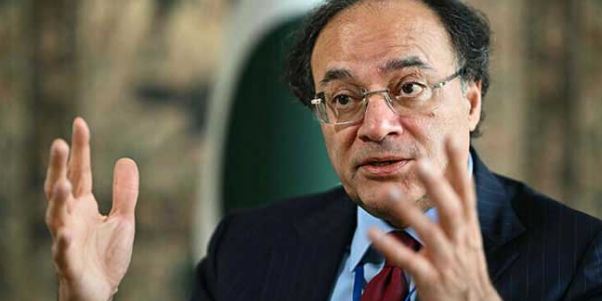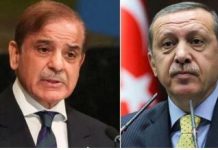ISLAMABAD: Finance Minister Muhammad Aurangzeb has termed the federal budget 2025–26 a “strategic document”, saying that the government is prioritising structural reforms, enforcement measures, and relief for lower-income groups to ensure equitable fiscal growth.
FinMin Aurangzeb presented the federal budget for fiscal year 2025–26 with a total outlay of Rs17.57 trillion, setting a 4.2% GDP growth target and announcing relief measures for the salaried class, while overall federal expenditure was slashed by 7%.
Presenting the federal budget 2025-26 in the National Assembly, the finance minister highlighted that the budget for the upcoming fiscal year was the beginning of the strategy, especially chalked out to promote a competitive economy.
“It will help increase foreign exchange reserves, reduce the fiscal payment imbalances, thus promoting the overall economic productivity,” he said.
Speaking on Geo News programme ‘Aaj Shahzeb Khanzada Kay Sath’, the finance minister said the budget was designed with three key objectives — structural reforms, fiscal signalling, and enhanced enforcement.
He described the reforms as Pakistan’s “East Asia moment,” stressing that tariff restructuring is critical to making the local industry competitive, boosting exports, and correcting the anti-export bias that has long plagued the economy.
Aurangzeb explained that the government aimed to send a clear signal about the future direction of tax policy. Since assuming office, he said, no tax that had been increased had been reduced, and this perception needed to change.
The budget, he maintained, signals that the government is now committed to creating stability, transparency, and predictability in the taxation framework.
He emphasised that targeted relief has been extended to the salaried class, particularly those in lower-income slabs.
A surcharge, he said, had been imposed only on individuals earning over Rs10 million annually. “You could impose a 2% or 5% surcharge instead of 10%, but these decisions are trade-offs. We tried to give as much relief as possible to the lower-income groups within the fiscal space available,” he noted.
The minister categorically ruled out the introduction of any new taxes, stating that the country must now rely on enforcement to increase revenue and move towards the target of a 13.5% tax-to-GDP ratio.
He said that enforcement will play a central role in plugging leakages, resolving tax litigations, and expanding the net, especially in the retail and wholesale sectors. He revealed that the government had already collected Rs390 billion through enforcement measures, a feat initially doubted by the International Monetary Fund (IMF).
“An almost similar enforcement-related revenue projection has been made for the next fiscal year, backed by the government’s performance track record,” he added.
On the expenditure side, the finance minister said significant austerity measures had been taken. “Subsidies have been curtailed, while grants under the Benazir Income Support Programme (BISP) have been enhanced to protect the vulnerable. Operational costs of the government have been rationalised to keep expenditures steady,” he added.
He also addressed the government’s decision to increase public sector salaries by 10%, a figure notably lower than last year’s 20–25% hike. He said the increase was in line with headline and average inflation and that the final decision was taken by the cabinet after reviewing multiple proposals.
He added that a deliberate effort was made to widen the differential in favour of lower salary brackets to provide more meaningful relief at the bottom.
Acknowledging the government’s limited fiscal space, the finance minister said efforts were made to cushion the impact on the most vulnerable while urging the upper-income groups to understand and accept the need for short-term sacrifices. “This pain must be managed. Our job is to address where the pain is greatest… we must acknowledged the pain of upper segments and signal that we will move in the same direction,” he added.
He noted that currently, a salaried individual is required to fill out an 800-column tax form, even though their income is deposited directly into their accounts and taxes are automatically deducted.
“Why should they go through this cumbersome process?” he asked, announcing that the government is working on reducing the form to a simplified 9-column version. This new form will cover wealth, income, and tax, and will aim to be auto-filled.
“The goal is for 70 to 80% of the salaried class to be able to file taxes on their own, without needing the assistance of lawyers or tax consultants,” he said.
He acknowledged a common sentiment: “People tell me — take taxes from us, but don’t hand us over to the FBR.” He added that the credibility and trust of the tax collection authority must be restored. In line with the Prime Minister Shehbaz Sharif’s directive, efforts are underway to achieve this, with automation and digitisation being key priorities.
Speaking on the issue of non-filers, the finance minister remarked that Pakistan might be the only country in the world with a legal category for non-filers. As part of the upcoming legislation, the government intends to eliminate the distinction between filer and non-filer, moving instead toward a unified “eligible” category under the money bill.
Commenting on the petroleum development levy (PDL), he clarified that it should not be viewed purely as a revenue-generating measure. Instead, it is linked to climate resilience and the broader climate change agenda. “One-third of the IMF’s 13 reform pillars and the country partnership framework focus on climate change,” he said.
He also mentioned a new carbon levy, which is intended to discourage the use of fossil fuels and promote a shift towards electric vehicles and renewable energy sources. “Again, this is not necessarily a revenue measure but a step towards sustainable environmental policy,” he added.
On the NFC Award, Aurangzeb said that the National Fiscal Act had already been signed by the provinces and is built around three key components: revenue, expenditure, and governance. He confirmed that the government has requested formal nominations from the provinces for the NFC Commission.
A meeting has been summoned by the Prime Minister to discuss possible revisions to the NFC Award. Aurangzeb stressed that the sustainability of Pakistan’s economy hinges on addressing two critical issues — climate change and population. “If we are to achieve sustainable growth, we must confront these two fundamental challenges,” he concluded.

















